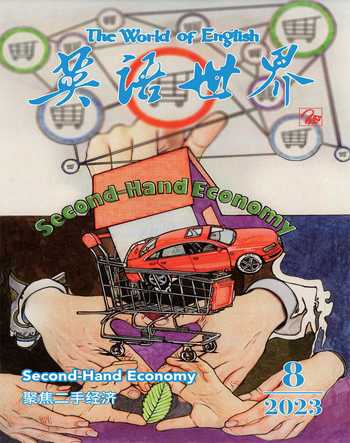ChatGPT and the Dawn of the New Dark Ages ChatGPT与新黑暗时代的来临
2023-08-21瓦莱丽·赫德森
瓦莱丽·赫德森
Playing with ChatGPT from Open-AI has become all the rage1 at the moment. This online correspondent powered by artificial intelligence will attempt to answer your questions with a paragraphs worth of knowledge2, write lyrics or pen stories from prompts you suggested, and more, with all responses derived from information processed by algorithms.
目前,跟OpenAI所研发的ChatGPT互动已成了潮流。这位网络笔友由人工智能驱动,它会把知识组织成段落来回答你的问题,根据你给的提示词写歌词或写故事,等等,而它所有的回答都源自经算法处理过的信息。
ChatGPT writes on the level of sophistication of about a sixth grader, Id say, scraping the vast amount of online knowledge to do so.
依我看,ChatGPT的写作水平与六年级学生相当,它在网上搜刮了大量知识来完成写作。
Not surprisingly, people are worried about the bias of ChatGPT: online source material can be very much in line with favored narratives, especially as social media companies have been revealed to actively bury certain viewpoints in favor of others, even burying particular unwelcome facts.
人们担心ChatGPT会怀有偏见,这并不奇怪:网络原始材料和大众偏好的叙事高度一致,尤其是社交媒体公司已遭到曝光,称它们主动隐藏某些观点、推崇另一些,甚至隐藏某些不受欢迎的事实。
The world is starting to react. Schools are now deliberating whether to embrace ChatGPT or view it as plagiarism. Artists are suing, as lyrics and visuals created are all by definition derivative of works by human beings. Lobbyists may find their work much easier, which may not be to the public good. Troublingly, humans are also turning to ChatGPT as a kind of ouija board3, asking AI what they should do in their personal circumstances, such as whether to divorce a spouse.
全世界都开始作出反应。学校在考虑是欣然接受ChatGPT,还是将其视为剽窃。艺术家们纷纷起诉,因为AI创作的歌词和视觉资料,按定义说都衍生自人类作品。说客们也许发觉工作更轻松了,可这对公眾利益不一定是好事。令人担心的是,还有人把ChatGPT当作某种占卦板,向AI咨询如何处理一些私人问题,比如要不要与配偶离婚。
Theres some larger questions here, though. With the advent of ChatGPT, there has been increasing discussion about whether Western civilization is moving into a “post-literate” era. Were at a 40-year low in the U.S. in terms of young people reading for pleasure, according to Pew Research4. Bosses complain their younger employees boast that they dont read emails—even work emails—at all. Universities are dropping requirements for standardized test scores and even personal statements from applicants. Short TikTok videos and 280-character tweets are the limited and limiting daily fare of the rising generation.
不过,还有一些更严峻的问题。随着ChatGPT的出现,越来越多的人讨论西方文明是否正进入“后文字”时代。皮尤研究中心的数据显示,在美国,为乐趣而阅读的年轻人的数量处于40年来的最低点。老板们抱怨说,他们的年轻员工夸口说压根不看电子邮件——连工作邮件都不看。大学正逐步降低对申请者标准化考试成绩乃至个人陈述的要求。国际版抖音短视频和280个字符以内的推文是新一代人每日有限的信息源,其内容还有局限性。
Its hard not to see a post-literate Western society as the advent of a new type of Dark Ages5. What we know occurred is that the knowledge, learning and thinking skills accrued during the golden ages of Greece, Rome and Arabia were largely lost to the rising generations through war and destruction. This time around, these things are being lost to our advances in technology—but the effect is still the same.
處于后文字时代的西方社会,很难不被视为一个新型黑暗时代的前奏。我们知道,希腊、罗马和阿拉伯的黄金时代所积累的知识、学识和思维能力,在战争和破坏中大量失传于后人。这一次,这些事物正是因我们的技术进步而散佚——但结果是一样的。
What is being lost? First, the younger generation does not commit know-ledge to memory6; why should they? The internet serves as their memory. But without substantive knowledge banked in your own memory, you cannot think well. For example, I remember when a colleague told me that our masters students in international affairs did not need to know where Afghanistan was on a map because they could just Google it. I would argue that if you do not have a mental idea of where Afghanistan is and what nations surround it, you simply cannot think at a sophisticated level about Afghanistan.
哪些东西在消逝?第一,年轻一代不把知识记在脑子里;他们何必去记呢?互联网就是他们的记忆中枢。但如果脑中没有充实的知识储备,人就无法进行透彻的思考。举个例子,记得有位同事告诉我,我们国际事务专业的硕士生无需知道阿富汗在地图上的位置,因为可以直接上谷歌搜索。我要说,如果你脑海里对阿富汗在哪儿、周边有哪些国家没有概念,你就不可能从深层次思考阿富汗问题。
And if you outsource your personal knowledge base to Google or AI, you may or may not receive factual information, as my little experiment demonstrated. The line between fact and opinion, always contested, is now being given up for lost. Whats true according to ChatGPT depends on what part of the internet it has happened to scrape at a particular time. And that in turn is dependent on what social media companies boost, and what they bury. The idea that we would seek a truth that stands independent of our viewpoint is considered quaint, even silly. So much for7 the Renaissance.
正像我的小实验所证明的那样,如果你把个人知识库外包给谷歌或者AI,你可能会得到事实性的信息,也可能不会。事实和观点之间的界限始终有争议,现在人们正在放弃划清这条界线的希望。ChatGPT认定的真实,取决于它在某时刻碰巧搜罗了互联网的哪一部分。而这又取决于社交媒体公司宣传什么,又遮掩什么。寻求不受个人看法影响的真理成了老古板,甚至愚蠢之举。文艺复兴就别指望了。
Second, allusion is lost. The cultural touchstones that enriched our society are just gone. If I used the phrase, “Ask not what your country can do for you,” many of my students would not know it was JFK who immortalized that phrase. If I were to say, “Blessed are the peacemakers,” many of my students would not know it was Jesus Christ who said this. And dont even think about a Shakespearean8 allusion.
第二,典故在消亡。赋社会以丰沛的文化试金石不复存在。如果我引用“不要问国家能为你们做些什么”这句话,我的许多学生不会知道是肯尼迪让它流芳百世。如果我说,“缔造和平的人是有福的”,许多学生不会知道这是耶稣基督说的。更遑论莎士比亚作品中的典故了。
Third, deep reading and critical thinking skills are lost. The most important arguments cannot be distilled into 280 characters. These arguments are not only deep, but they are wide and nuanced, and have many dimensions. And it is in that richness that critical thinking becomes possible, as one dives beneath the thin surface of an argument to its complex roots to understand where the weaknesses are. In our time, there is but shallow understanding, for all nuance has been lost. Indeed, even debates on controversial issues, where one could hear critical thinkers engage each others viewpoints, are now anathema because if there is only surface, what could there be to debate?
第三,深度阅读能力和批判性思维能力在丧失。最重要的论证没法凝练成280个字符。这些论证不但高深莫测,也宽广无际、细致入微,有诸多维度。正是在此种详实的论证中,批判性思维成为可能,因为人可以从某条论点薄薄的表面层深潜下去,遁入其复杂的根源,以了解这一论题的弱点所在。我们的时代空有肤浅的理解,因为一切细微的差别业已丧失。事实上,争议性问题的辩论中本可耳闻批判性思想家们的观点交锋,如今却也令人极度反感,因为空谈表象,还有什么可辩论的呢?
Last, of course, is that all these things combine to create not only extremist ideologies divorced from reality, but these in turn create mobs who are prepared to literally or figuratively rend dissenters limb from limb in the quest for purity of thought.
最后一點当然是,以上所有因素结合在一起,不仅制造出脱离现实的极端主义意识形态,而且这些意识形态进而制造了群氓,他们为求思想的纯粹性,准备从字面上或象征意义上,将异见者撕成碎片。
All of this also means that those who continue to read and to practice critical thinking skills will increasingly be unable to effectively communicate with those who do not.
这一切还意味着,继续阅读、继续训练批判性思维技能的人,将越来越无法和不读不练的人有效沟通。
Some have suggested that the only way forward is to emulate those histor-ical oases from the Dark Ages: the monasteries—more particularly, an offline, hard-copy repository of the worlds knowledge that can be resurrected by its keepers once the current Dark Ages have passed. I do my small bit by insisting my students memorize a map of the world and important historical facts, figures and dates.
有些人认为,唯一的出路是效仿黑暗时代的那些历史绿洲:修道院——更确切地说,一个离线的、纸质的世界知识宝库,待当前的黑暗时代过去,它的保存者就可以使其复活。我坚持让学生识记世界地图和重要的历史事实、数字、日期,以尽我绵薄之力。
Ill end with an allusion—see if you recognize it. “Do not go gentle into that good night ... Rage, rage, against the dying of the light.”9 In your own way, and however you can, keep the light alive during these new Dark Ages.
我将以一个典故收尾——看看你认不认得出。“不要温和地走进那个良夜……怒斥,怒斥光明的消逝。”用你们自己的方式,不管是什么样的方式,在新黑暗时代让光长明不灭。
(译者为“《英语世界》杯”翻译大赛获奖者)
1 be all the rage风行一时,十分流行。 2 a… worth of sth像……那么多的东西。
3 ouija board通灵板,占卜板。 4美国的一间独立性民调机构。 5黑暗时代(欧洲历史上从罗马帝国衰亡至公元 10 世纪的时期)。
6 commit to memory牢记。
7 so much for(表示行不通或没用)作罢好了。 8 Shakespearean由莎士比亚写的;与莎士比亚有关的;典型的莎士比亚式的。
9该诗句出自《不要温和地走进那个良夜》,由英国诗人狄兰·托马斯创作于20世纪中期。此处采巫宁坤的译本。
